
Job hunting today often starts with a search for tools that make a resume look and feel like the professional you are - but not every builder fits every situation.
We frequently hear readers weighing alternatives to Novorésumé because of differences in pricing models, the need for more design flexibility, or desire for AI features that better match their workflow. Whether you're conserving budget, chasing a creative layout, or looking for a builder that supports rapid multi-version tailoring, the right alternative comes down to which features solve your personal pain points.
When we evaluate alternatives, we focus on practical signals that matter in an active job search: template quality and variety, ease of getting your existing info in (LinkedIn or file import), the quality and control of AI writing or rewriting tools, export options (PDF/DOCX), and clear, predictable pricing that fits short-term or long-term needs. Below we walk through the best options to consider in 2025, why each might be a fit, and how they compare head-to-head to Novorésumé so you can decide with confidence.
We compiled this list by combining product pages, recent pricing and feature documentation, and independent user feedback from review sites and forums to reflect how these platforms perform in real searches and real workflows.
We prioritized builders that offer: straightforward import/export, clear pricing (including trials), meaningful AI assistance (for rewriting / suggestions), and templates that can be customized without long design fiddling. Where available, we cross-checked official feature pages with user reviews on sites like Trustpilot, Sitejabber and community threads to surface recurring strengths and weaknesses.
We also supplement our opinion with user-review references from review platforms and community posts to surface authentic user experience. This helps you see both the marketed feature set and how real users experience billing, support, and product reliability.
We position Resumonk as a pragmatic alternative focused on clean design, straightforward customization, and a credit-based AI feature set that lets users pay only for the AI work they need.
Resumonk offers 20+ premium templates (including photo-CV styles), a LinkedIn import, and both PDF and DOCX export; its customization includes an unlimited color palette and 18 font choices so you can quickly align design to industry or personal brand. The product's credit model for AI edits gives precise control for users who want occasional AI rewrites without an ongoing high monthly fee.
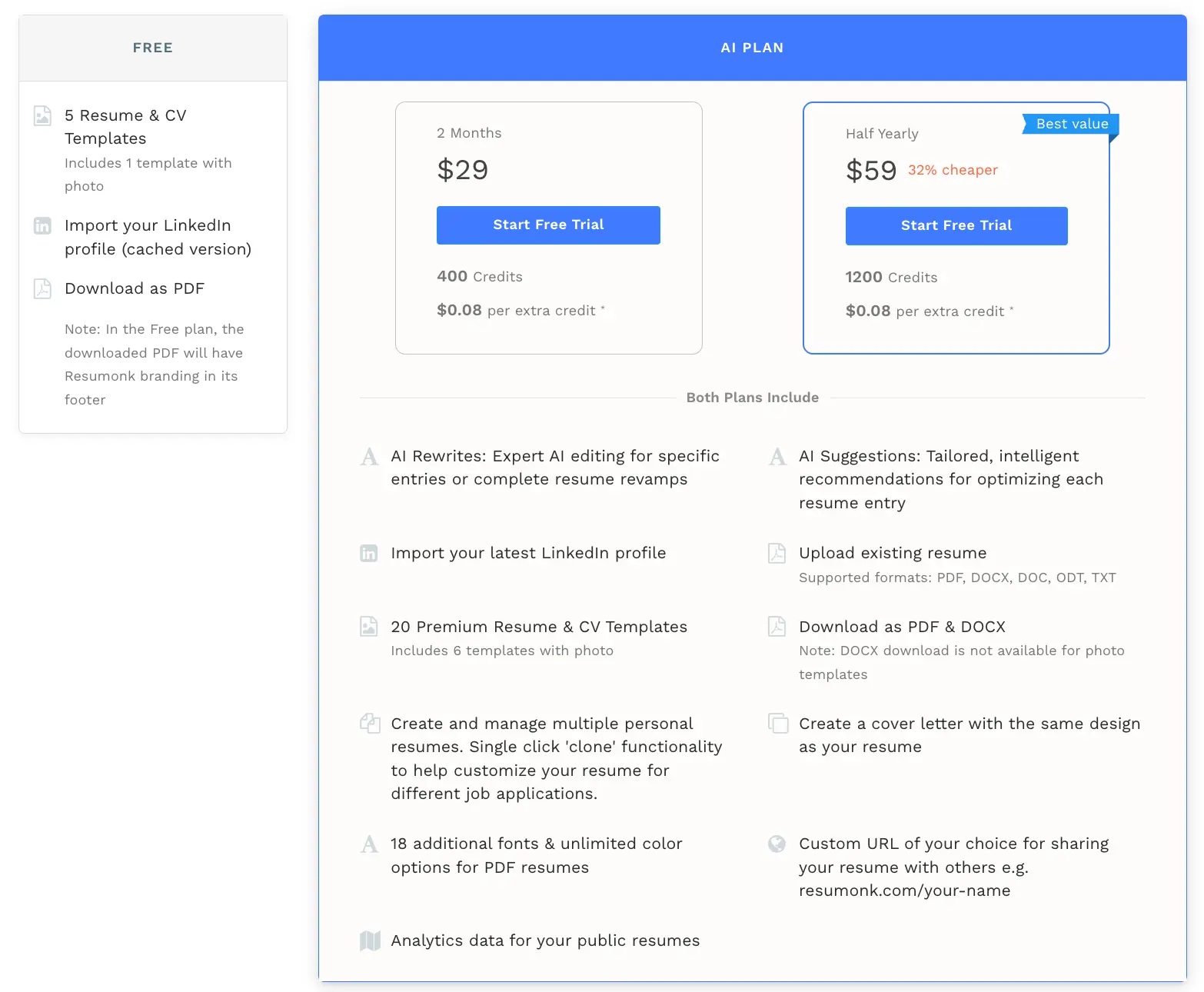
Resumonk provides a Free tier with branded downloads and two paid AI plans: a 2‑month plan (400 credits) and a 6‑month plan (1200 credits), plus the ability to buy extra credits at set rates - a model that suits users who want bursts of AI help rather than continuous subscription billing.
Kickresume positions itself as an AI-forward builder (including GPT-powered writers and an AI career coach) while also providing a broad sample library and a personal website builder.
It’s a strong pick for students and early-career users because of its free Premium access for verified students and a focus on polished, recruiter-friendly visuals. Kickresume's mobile apps make it convenient to retrieve and edit documents on the go.
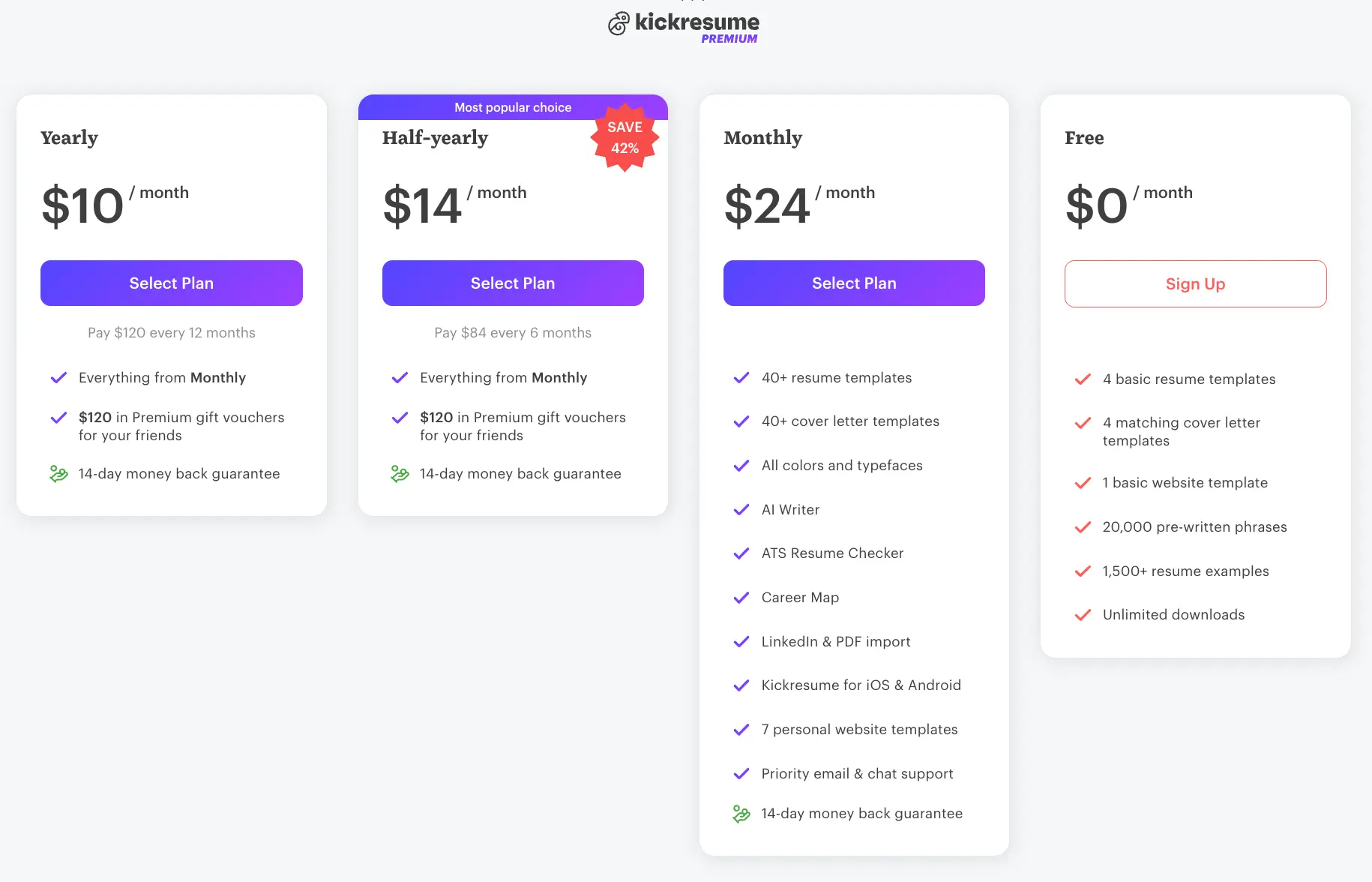
Pricing is tiered: monthly, half-year and annual options are available, with frequent student promotions; Kickresume’s structure tends to favor users who plan to use the product actively for several months (or who qualify for student access).
Zety is a step-by-step builder that offers strong guidance for first-time resume creators and many role-specific content examples.
Its emphasis is on helping users craft content through tips and pre-written suggestions, paired with 60+ industry-specific templates and an integrated job board that can help coordinate applications. Zety suits users who want hands-on content help while still keeping design choices simple and professional.

Zety often markets a low-cost trial (commonly a $2.70 or similar short trial) and an annual plan billed upfront; its free builder allows limited downloads so users can test templates before committing.
Resume.io is a professional-first builder with an AI assistant that offers resume review, strengths analysis and an integrated job tracker. It’s a good fit for mid-career professionals who want a no-nonsense toolkit: polished templates, a review workflow, and the ability to create multiple, exportable versions quickly.

Resume.io offers a trial period (7 days at a low trial rate) and varying billing cadences (weekly/monthly/quarterly), which traders between short-term experimenting and quarterly/annual commitment.
MyPerfectResume is a guided builder that walks users through one section at a time - a format that appeals to students and entry-level candidates who need structure and clear writing prompts. The platform includes a content suggestion engine and a library of career resources that help transform outlines into polished, role-focused bullet points.
Pricing options include a short trial and an annual plan billed up front; this model is attractive if you want to test the product risk-free and then keep long-term access for ongoing updates.
Enhancv leans into design-first resumes for creative and design careers - its templates and section options are tailored to visually showcase projects, side-work and portfolio highlights. If you need unique section types (projects, languages, creative sidebars) and strong visual control, Enhancv is worth evaluating.
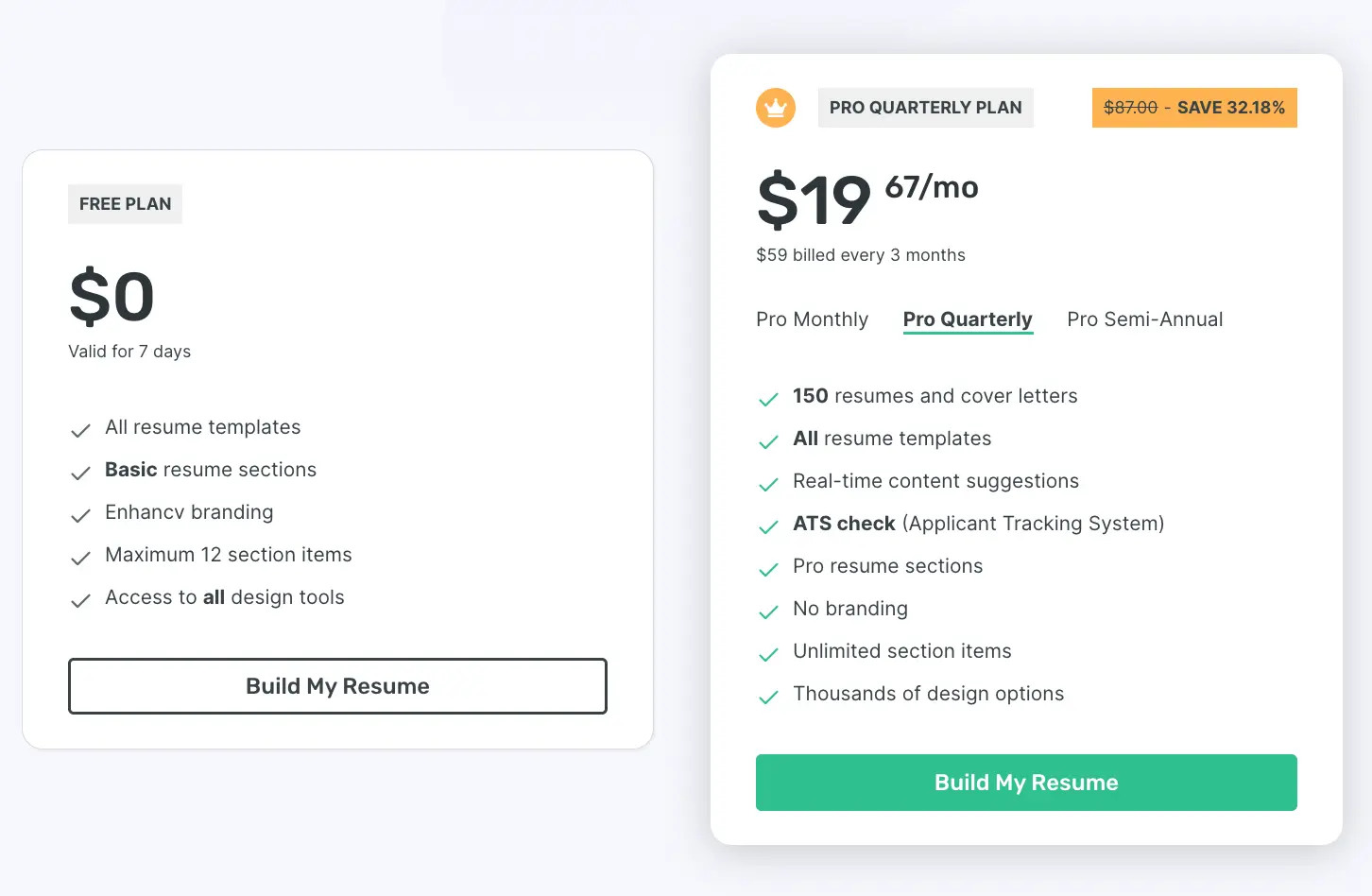
Enhancv offers several subscription cadences (monthly, quarterly, semi-annual) and short free trials so creative professionals can decide whether the visual tools justify an ongoing plan.
ResumeGenius focuses on speed and a rich pre-written content library to get a usable resume completed quickly. Users who want fast drafts and lots of example phrasing will appreciate the guided flows and one-click suggestions that help fill role-specific bullets.
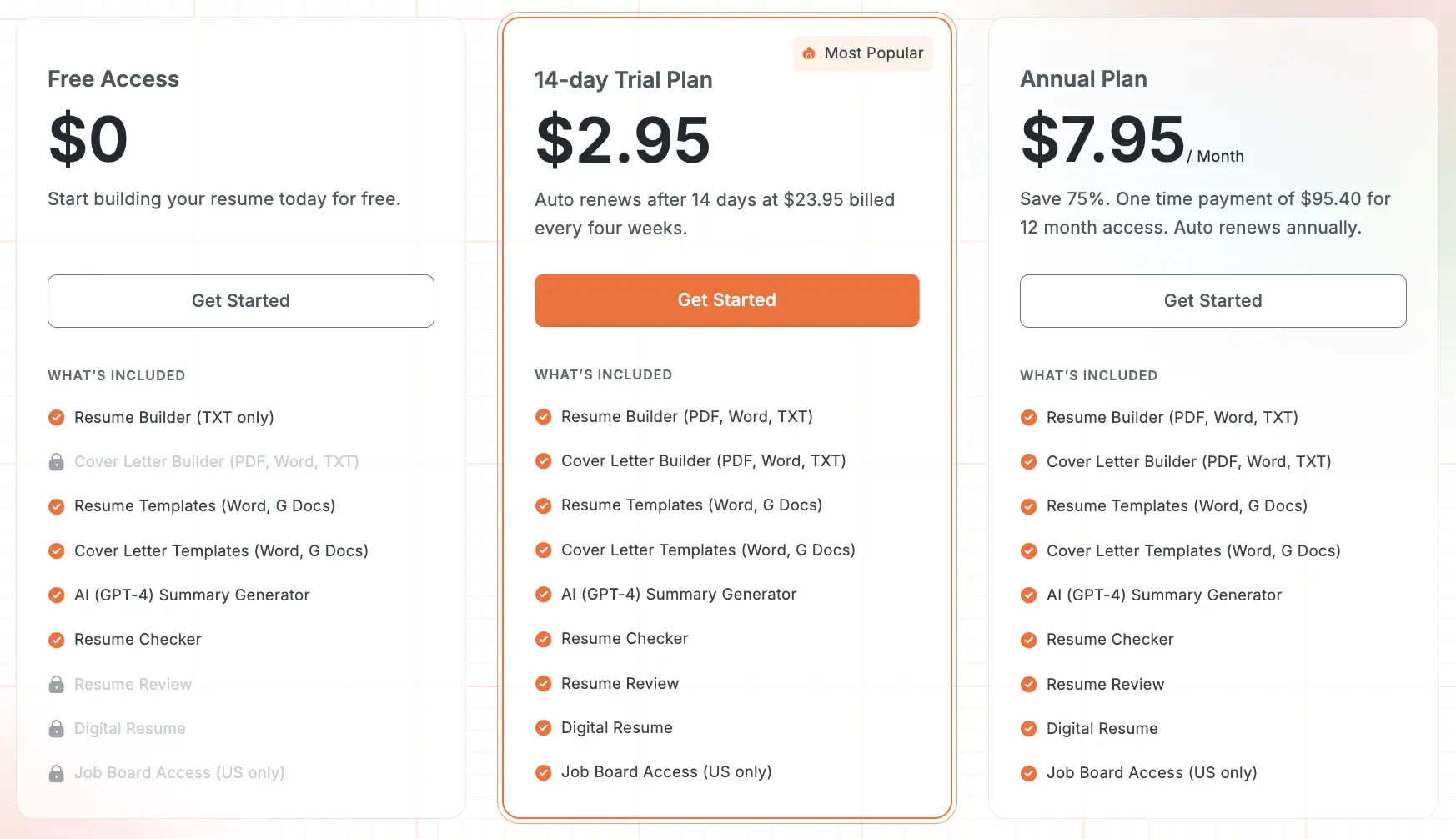
ResumeGenius typically offers a short, low-cost trial with automatic renewal into a subscription - good for users who want a quick, hands-on way to create and download a resume without a long commitment. We also reviewed user feedback on Trustpilot and Sitejabber to understand billing and cancellation experiences.
LiveCareer is a longstanding player with deep career resources and a large template library; its age shows in broad coverage for traditional job categories and a wealth of resume examples. If you want a mature resource ecosystem - articles, guides, and long-form career help - LiveCareer is a practical choice.
LiveCareer’s pricing tiers reflect combinations of builder access, document downloads and extra services; its platform is better suited for users who value a full career resource set alongside the builder.
Rezi is an AI-first player that emphasizes formatting and targeted content optimization. Rezi’s tools are aimed at applicants who need precise structure and keyword-conscious content generation; its Pro and lifetime plans are useful if you expect to iterate often and want a dedicated AI workflow for content targeting.
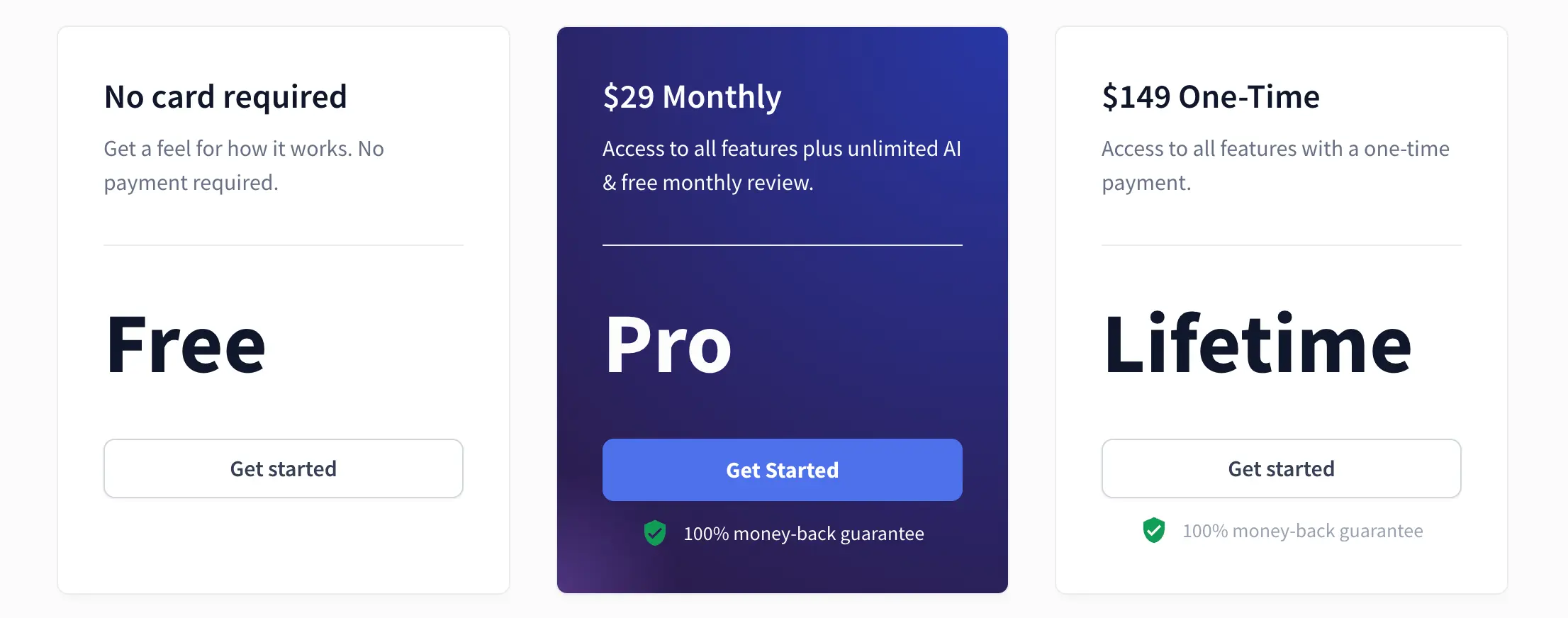
Rezi’s pricing includes a free tier, a Pro monthly plan, and sometimes a lifetime one-time option - a good fit for power users who want guaranteed refunds and the option to buy long-term access.
When comparing the two, Resumonk’s offering centers on a compact but practical template set (20+ premium templates with multiple photo-CV options) paired with deep surface customization - an unlimited color palette and 18 font selections that let you tune visual tone quickly.
Novorésumé takes a different route: it offers multiple curated themes with a focus on polished, specialty sections and export-ready PDFs. For candidates who need quick, simple edits and the ability to produce many versions (Resumonk's clone feature), Resumonk’s customization depth is advantageous; Novorésumé’s strengths are in its curated layouts and specialty structural elements for targeted resumes.
Both platforms produce recruiter-ready PDFs, but Resumonk leans toward flexibility for users who want to customize brand elements across multiple versions, while Novorésumé focuses on curated, ready-to-publish templates for users who prefer a guided visual standard.
Resumonk’s AI functionality is built around a credit-based model: small, discrete AI tasks (single-entry rewrites, suggestions, or full-resume rewrites) consume credits so you only pay for what you use.
Novorésumé offers a chat-style assistant and content generation tools integrated into its editor with different usage limits depending on the plan.
Practically, Resumonk’s approach favors users who want control over individual edits and predictable per-action costs; Novorésumé’s assistant is designed for more conversational drafting within the editing session.
Both produce usable text, but the control model (credits vs.
more open chat access) determines which feels cost-effective for occasional vs. heavy AI users.
Which model wins depends on usage patterns: infrequent AI edits make Resumonk’s credits attractive; sustained AI drafting favors Novorésumé’s bundled access.
Resumonk supports LinkedIn import and uploads across PDF, DOCX, DOC, ODT, and TXT formats, letting users bring in existing content quickly and export into PDF and DOCX for sharing.
Novorésumé emphasizes polished PDF exports (with advanced layout fidelity) and provides import options as well - both platforms make migration straightforward, but Resumonk’s broader set of accepted upload formats makes it convenient for users bringing in older DOC or ODT files. If you have complex legacy documents, Resumonk’s wider format support reduces manual re-entry.
Resumonk uses a credit-based AI system and two main paid plans: a 2‑month plan (400 credits) and a 6‑month plan (1200 credits) with the option to buy additional credits - extra credits are priced per unit which can be economical for occasional AI users.
Novorésumé’s pricing is structured around fixed premium periods (monthly, quarterly, annual) with one-time payments for each period rather than automatic subscriptions in many regions; for example, public pricing lists a monthly option near $19.99 and annual tiers that reduce the per-month cost when paid upfront. The practical takeaway: if you need occasional AI help and want predictable per-edit costs, Resumonk’s credit model often provides better short-term value; if you prefer unlimited editing sessions during a dedicated job-search window, Novorésumé’s time-based premium windows may be a simpler choice.
We recommend matched selection based on use: pick Resumonk if you want per-action control and pay-as-you-go AI; pick Novorésumé if you’d rather buy a premium time-window with broader, bundled access.
Beyond templates and AI, Resumonk offers practical extras such as custom URL hosting with analytics (handy for sharing a stable resume link), resume cloning for quick multi-version management, and a cover letter builder that matches resume design.
Novorésumé provides useful job-application tracking tools and master resume management features that centralize content across versions. For active applicants who need to track applications and notes, Novorésumé’s built-in trackers are convenient; for professionals who want to publish an attractive public resume and measure views, Resumonk’s custom URL + analytics is a notable differentiator.
In short: Resumonk focuses on version control, shareability and targeted AI edits; Novorésumé focuses on curated presentation and an application-centric workflow. Your choice should match whether you prioritize public sharing and analytics or integrated application tracking and curated templates.
Free plans vary by what they actually allow you to download.
Kickresume is notable for permitting free template downloads and offering student premium access, while Resumonk provides a usable free tier with branded PDFs and basic templates so you can create a presentable resume without immediate payment. Most free plans limit advanced exports (DOCX or unbranded PDFs) so expect to upgrade if you want fully polished, unbranded documents.
Yes - most alternatives accept PDF or DOCX uploads and LinkedIn imports.
Resumonk and Kickresume explicitly advertise LinkedIn import, and many builders let you upload a PDF and then edit the parsed content. Expect some manual cleanup after import: section mapping and line breaks often need adjustment, but the heavy-lift of getting legacy work history into a modern template is substantially reduced.
Different AI implementations serve different needs: Kickresume emphasizes GPT-based full-section generation and career coaching, Resumonk uses a credit-based AI rewrite model for targeted edits, and Resume.io and ResumeGenius provide review-style AI feedback and strengths analysis. We avoid naming an absolute winner - pick by use case: full-draft generation (Kickresume), granular paid edits (Resumonk), or review and scoring (Resume.io / ResumeGenius).
Yes - many platforms are mobile-responsive; Kickresume explicitly provides iOS and Android apps, while others offer responsive web editors that function on tablets and phones. For extensive editing or multi-version management, desktop remains more comfortable, but quick edits, downloads, and sharing can often be done from a mobile device.
There are many strong alternatives to Novorésumé - each emphasizes slightly different strengths.
We encourage you to list your priorities (budget, AI usage pattern, degree of design control, and whether you need tracking or public hosting), try two platforms using free plans or trials, and choose the one that fits your application cadence and content workflow. The right tool supports your story; it doesn’t replace it.
Remember: the builder is a means to an end.
A well-crafted resume starts with clear, quantified accomplishments and ends with consistent tailoring for each role.
Use trials to compare real outputs, and pick the platform that gets you to submission-ready resumes fastest - then double down on content quality and outreach. Good luck - and we’re here to help with templates, examples and targeted rewrites when you need them.